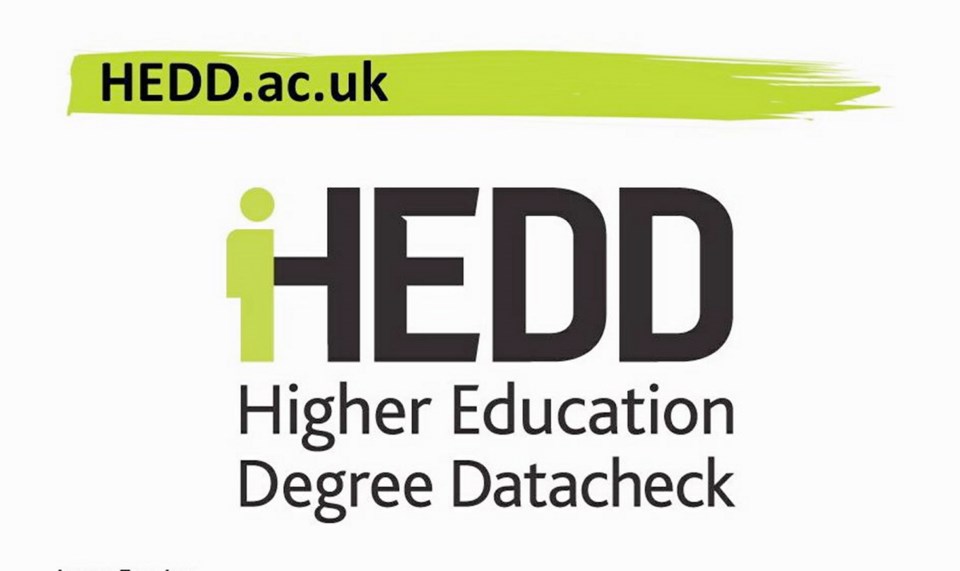It was almost inevitable as the technical quality of social media continues to improve it would provide new prospects for online fraudsters.
While fake university sites are nothing new, in the U.K., the U.S. or Canada, there are far more sophisticated operations now that in some cases are multimillion-dollar businesses offering fake degrees and diplomas.
In response to this, a new and equally profitable business, the Higher Education Degree Datacheck service in the United Kingdom, offers “a centralized system for degree verification that connects employers, agencies, universities, embassies and municipal employers.”
To stem the tide of fake degrees and certificates, the “selfie generation” of students, especially those who have just graduated, have been urged not to post pictures of themselves posing with their diplomas online.
Last year, a company based in Pakistan was shut down after allegedly making millions of pounds sterling selling fake university degrees.
It is apparently a simple matter to copy the certificate, add a new name and mugshot and presto, no more need to spend three to five years in a university.
Jayne Rowley, chief executive of the HEDD service, has been quoted saying that “the selfie generation and the need to share these things online is fuelling multimillion-dollar trade because fraudsters can make these detailed copies.”
The most accurate fakes, which are sold online for about 220 pounds (about $380 Cdn) can be used to deceive prospective employers and are considered such a threat that 20 U.K. universities are offering digital certificates that cannot be faked.
Graduates are also asked to give companies a login to access a copy and check credentials.
In Canada, CBC’s Marketplace exposed the surprising proportions of the business in fake degrees by successfully obtaining fake transcripts from non-existent universities with a list of bogus courses never attended and even supported by bogus GPAs attested to by a fake receptionist at the fake school listed on the degree.
According to CBC investigators, “as bachelor degrees become more common and job competition heats up, experts estimate that up to half of all new American PhDs are fake.”
Many of these phony qualifications were obtained by engineers, legal clerks, CEOs, politicians and even teachers from the world’s largest diploma mill, again in Pakistan.
CBC’s Marketplace investigative team obtained the business records of a Pakistan-based IT firm called Axact. The team spent months combing through thousands of degree transactions, cross-referencing personal information with customers’ social-media profiles.
The investigation revealed more than 800 Canadians could have purchased a fake degree.
What kinds of online qualifications are available? Take your pick: Engineering, law and, unbelievably, medical degrees are available, not only from diploma mills but from non-existent universities.
A quick Google search on my laptop computer immediately produces an ad from an online outfit called “Same Day Diplomas,” which offers high-school graduation diplomas and transcripts, college and university diplomas and transcripts (your school name here) starting at $120 Cdn.
Without a qualm of any kind, “Same Day” offers “Match Replica” designs that use the same layout, wording and fonts as the originals “for just a little more.”
Recently, the University of Toronto began issuing its degrees with fraud-deterring holograms so that the authenticity of the degree can be checked.
The problem is increased by the fact that apparently Canada has no specific laws dealing with degree forgery, and even experienced human-resources officers are pushed to take the time to check and verify qualifications thoroughly.
In 2010, the University of Victoria found it necessary to review its hiring practices when an adjunct professor, who claimed he had a double doctorate, was found to have provided false credentials.
The same individual also worked for an Island Health clinic, but while his employment references had been checked, the employer saw no reason to verify his claimed academic credentials.
The University of British Columbia offers a service called AuraData, which bills itself as Canada’s premier education-verification service. The service is available to prospective employers, academic institutions and other authorized third parties.
However, federal and provincial legislation in Canada requires permission to research any information identifiable to an individual, and AuraData requires signed authorization from the individual.
For busy human-resources officers, already mired in a lengthy hiring process, this is often the last detail attended to, if at all.
Given the loosely regulated world of fake qualifications, employers, with school districts and universities at the head of the list, certainly need to take “caveat emptor” as essential and serious advice these days.
Geoff Johnson is a former superintendent of schools.



